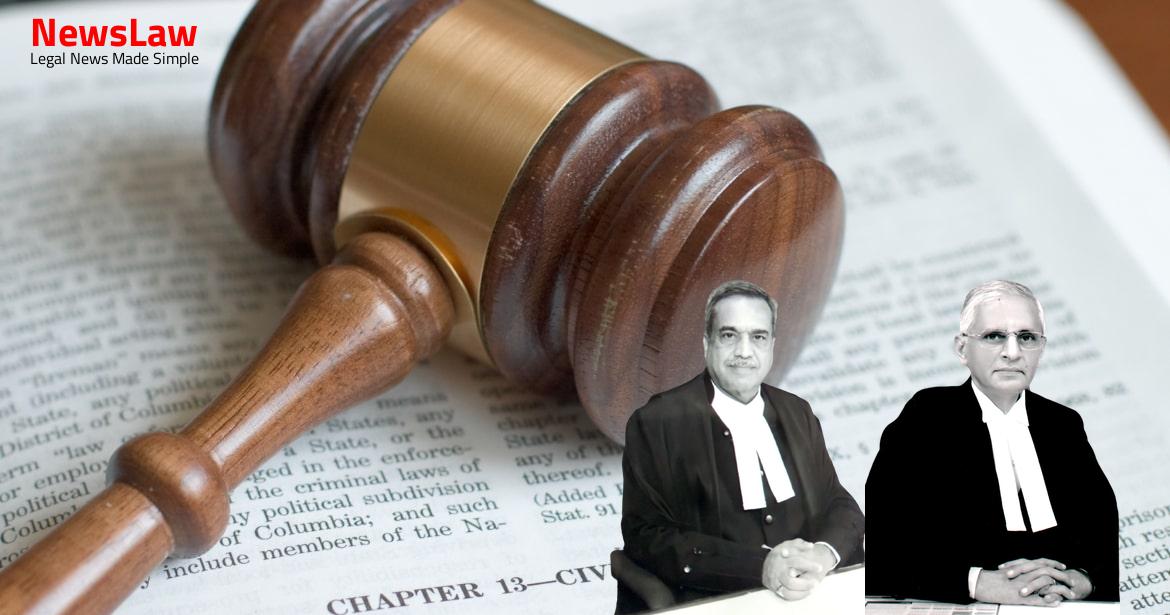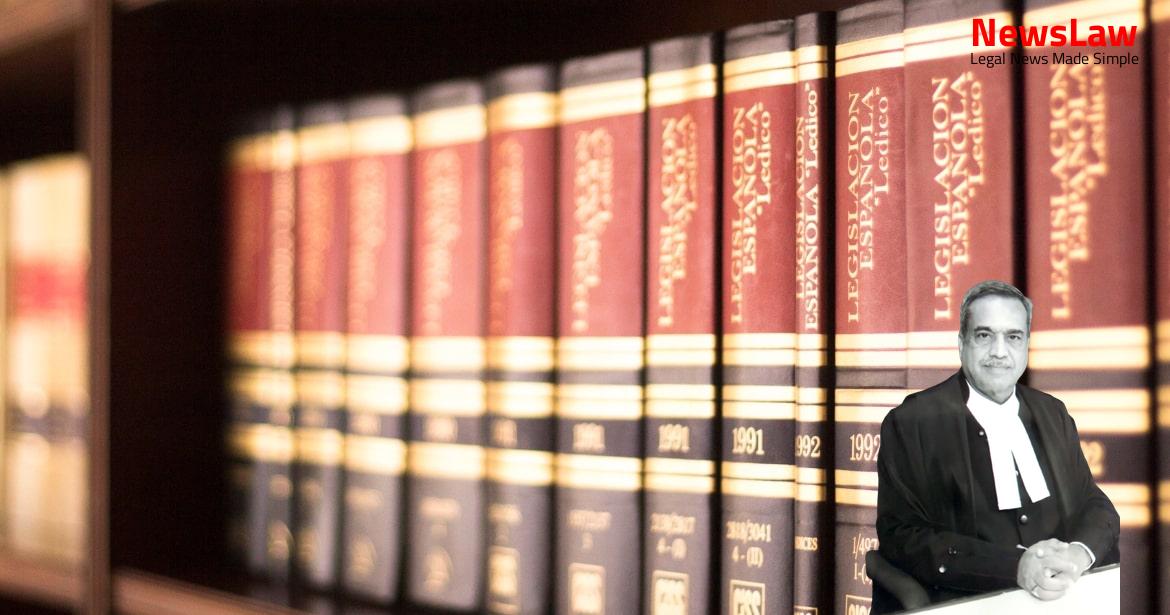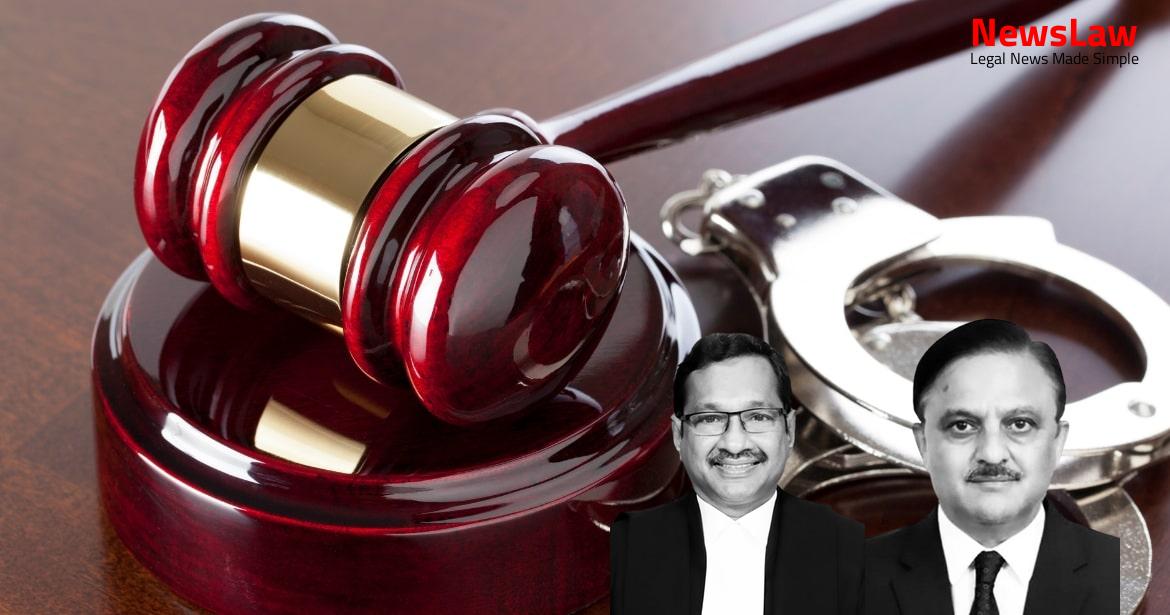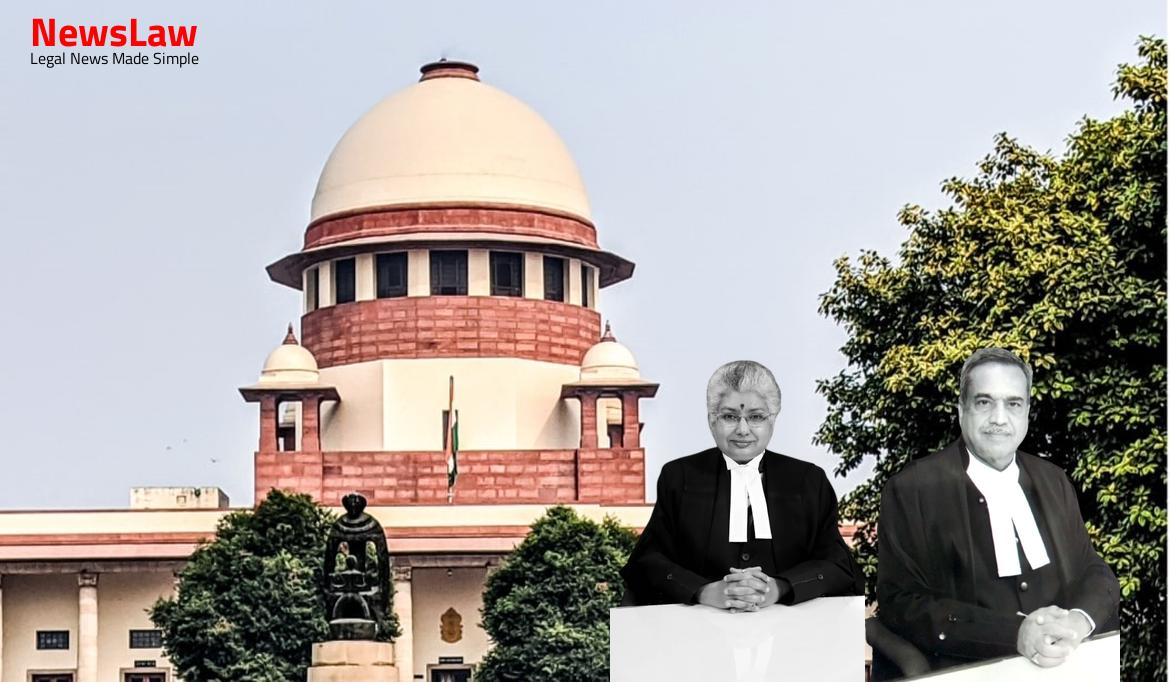Delve into the intricate legal analysis of committal proceedings in criminal cases. Understanding the significance of the court’s role in ensuring justice and upholding the rule of law. The examination of Section 14 amendments sheds light on the complexities of procedural fairness and judicial review in the criminal justice system.
Facts
- An FIR was registered against the husband of the original complainant for various offences.
- The FIR was lodged by the respondent no.1, a Police Sub Inspector, alleging obstruction of duties and assault by the accused persons.
- The incident occurred in the context of increasing theft and loot in the village.
- The accused police officers allegedly abused the complainant based on her caste, caused injuries, ransacked her house, and threatened her family.
- The learned Magistrate took cognizance of alleged offences after considering the report submitted by the Deputy Superintendent of Police, SC/ST Cell, Dahod.
- Further investigation was ordered under Section 173(8) of the Code of Criminal Procedure due to lack of clarity regarding the involvement of certain accused individuals.
- The Deputy Superintendent of Police submitted a report stating that the alleged offences appear to have been committed by the accused persons.
- The complainant attempted to file a formal complaint on 07.09.2013 but resorted to filing the complaint before the learned Magistrate on 13.09.2013.
- The complaint was sent for investigation under Section 156(3) of the Code of Criminal Procedure based on the seriousness of the case and evidence presented by the complainant.
- The investigating agency filed a summary report stating that the statements of witnesses were general and vague, and there was insufficient evidence to proceed with the matter.
Also Read: Legal Analysis on Conviction Based on Sole Testimony of Prosecutrix
Issue
- Issue: Whether in a case where cognizance is taken by the learned Magistrate and thereafter the case is committed to the learned Special Court, whether entire criminal proceedings can be said to have been vitiated considering the second proviso to Section 14 of the Atrocities Act which was inserted by Act 1 of 2016 w.e.f. 1.2016.
Also Read: Legal Analysis on Concurrent Sentences in Drug Trafficking Cases
Arguments
- The learned counsel for the appellant argued that the High Court misinterpreted the amendment to Section 14 of the Atrocities Act.
- It was emphasized that the amendment does not exclude the provision of the Code of Criminal Procedure but clarifies that the bar of Section 193 of the Code of Criminal Procedure would not automatically apply.
- The counsel highlighted that the accused’s rights are not affected by the forum that takes cognizance and issues summons, as long as the accused can contest his rights before the correct forum.
- A reference was made to the case law of Rattiram vs State of Madhya Pradesh to justify the amendment to Section 14 of the Atrocities Act.
- The argument was made that the impugned judgment overlooks Section 460(e) of the Code of Criminal Procedure which relates to the date of the offence in question.
- It was contended that the Special Court, not the Magistrate, has the authority to take direct cognizance of the offence under the amended Section 14 of the Atrocities Act.
- The delay in lodging the FIR was addressed by stating that there was no delay in filing the complaint before the Magistrate.
- The counsel emphasized that the amendment to Section 14 aims at expediting the trial process and ensuring speedy justice.
- Lastly, it was argued that the High Court’s interpretation would unjustly favor the accused by not allowing them to be tried for serious offences, solely based on the forwarding of a final report to a wrong forum.
- The issue of sanction is subject to the test of prejudice and failure of justice.
- The case is a patent abuse of power.
- Even if Section 197 applies, the High Court should have directed the authorities to obtain sanction and then proceed instead of quashing the case entirely.
- The State’s counsel supports the appellant.
- No representation from the private respondent.
Also Read: Legal Jurisdiction and Award Finality in Arbitration Dispute
Analysis
- The High Court quashed and set aside the entire criminal proceedings under the Atrocities Act and the Indian Penal Code, which is not permissible.
- The magistrate has discretion in forming an opinion about the case and not accepting the police report.
- The role of the Magistrate in commitment proceedings has been restricted under the new Code, leading to the concept of ‘failure of justice.’
- Legislative history of the Atrocities Act amendments, specifically Section 14 pre and post amendment, must be considered.
- Victimology and fair trial principles are integral to the criminal justice system.
- The Special Court under the Atrocities Act has the power to directly take cognizance of offences.
- Irregularities in the committal proceedings do not necessarily vitiate the trial proceedings.
- Delay in lodging complaints and FIRs cannot be a sole ground for quashing criminal proceedings.
- Failure of justice or prejudice must be proven for a conviction to be set aside.
- Speedy trial and victim rights are crucial aspects of criminal jurisprudence.
- Non-compliance with procedural rules does not automatically invalidate trial proceedings.
- The Special Court’s powers under the Atrocities Act have been emphasized for speedy and fair trials.
- The change in committal proceedings under the new Code has reduced inefficiencies and delays.
- In Districts with less number of cases under this Act, State Government can specify the Court of Session as a Special Court with the concurrence of the Chief Justice of the High Court.
- The Courts established or specified will have the power to directly take cognizance of offences under this Act.
- Section 14 of the Act was considered both pre-amendment and post-amendment in the case of Rattiram and Ors.
- The pre-amendment Section 14 and post-amendment Section 14 were compared.
- Pre-amendment Section 14 provided for specifying a Court of Session as a Special Court for each district.
- Post-amendment Section 14 allowed for the establishment of an Exclusive Special Court for one or more Districts.
- The legislative history behind the insertion of the proviso to Section 14 of the Atrocities Act is discussed.
- The amendment aimed at providing for a speedy trial of offenses under the Atrocities Act to prevent atrocities against Scheduled Castes and Scheduled Tribes.
- The amendment gave power to the Special Court to directly take cognizance of offenses under the Act.
- The issue of whether the entire criminal proceedings are vitiated if cognizance is not directly taken by the Special Court is questioned.
- The accused had substantial rights prior to the case being committed to the Court of Sessions.
- Three conflicting decisions related to the committal procedure prior to the trial are discussed.
- Different views from cases like State of MP vs Bhooraji and Moly vs State of Kerala are presented.
- The importance of the committal stage and the need for proper procedures are emphasized.
- The differences in the old Code of Criminal Procedure and the existing one regarding commitments to the Court of Sessions are highlighted.
- The High Court was incorrect in quashing the entire criminal proceedings based on absence of sanction under Section 197.
- The High Court could have directed the authority to obtain sanction and proceed rather than quashing the proceedings.
- Serious allegations against the Police Officers of misuse of powers including beating of innocent persons and lack of action on complaints.
- The alleged incident occurred in the midnight, making it debatable if Section 197 of the Code of Criminal Procedure applies.
- The actions alleged against the accused Police Officers may not necessarily be part of their official duties.
Decision
- Present appeal is allowed to the aforesaid extent.
- Accused is to be tried by the learned Special Court with jurisdiction for the mentioned offenses.
Case Title: SHANTABEN BHURABHAI BHURIYA Vs. ANAND ATHABHAI CHAUDHARI (2021 INSC 674)
Case Number: Crl.A. No.-000967-000967 / 2021



